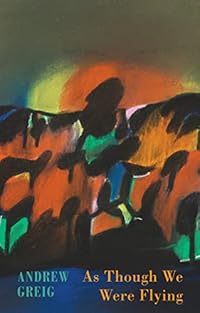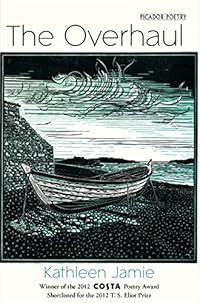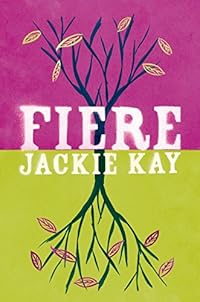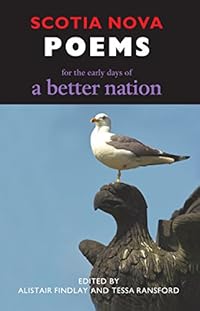Posted in Poetry, Scottish Literature, Andrew Greig at 20:00 on 18 April 2018
Bloodaxe, 2011, 62 p
One of the best authors I have discovered since starting the blog, Andrew Greig, started out as a poet. His first publications were books of poetry and then in amongst those he took to writing prose about another of his interests, climbing. He only took up novel writing after twenty years or so. He has also written a book about golf, another on fishing and the Scottish landscape, and, with Mike Heron, one about The Incredible String Band.
I thought I should sample his poetry, hence reading this, one of his most recent collections of poems.
The slim volume (nearly all poetry books are slim) is divided into three sections, Home for Now, The Light of Day and A Moment’s Liberty. The first poem, The Tidal Pools of Fife, is a lament for those lost pleasure grounds and there are five other poems set explicitly in Fife. More than a few deal with marriage – in especial A Long Shot compares the incredulous certainty of holing a putt as it moves across the green with the equally chancy outcome of being in the estate of matrimony. All are thoughtful and illuminating. But they need to be read, not written about.
Pedant’s corner:- In the contents page a poem is titled Eck Hutcheson but on page 20 is Eck Hutchinson (and twice in the poem itself,) “the fruit … are so nearly ripe” (the fruit is so nearly ripe,) “How could I live so long ……. and somehow failed to grasp” (and somehow fail to grasp,) “the crowd stream” (the crowd streams,) “her eyes propels the bird” (propel?) “above the river ,” (no space between river and comma.)
No Comments »
Posted in Scottish Literature, Poetry, Reading Reviewed at 10:00 on 26 March 2017
Picador, 2012, 59 p
Winner of the 2012 Costa Poetry Award, shortlisted for the 2012 T S Eliot Prize.
35 poems, most one pagers, one six pages, the rest two. 2 are eftir Hölderlin (as is one in Jamie’s later collection The Bonniest Companie). Hölderlin seems to be one of her favourite models. Most poems here are in English with the odd Scots word but some are entirely Scots. Nature, or those working in the outdoors, is an inspiration for many and there is an abiding seriousness to her poems, though she is not beyond essaying a pun for a last line. An odd quirk was that some poems had missing full stops at their conclusion, as if they’re unfinished. Understandable enough for those two entitled Fragment 1 and Fragment 2.
I most enjoyed Excavation and Recovery with its evocation of deep time partly because I have seen (in Perth and Abernethy Museums respectively) the log boat whose archaeological recovery it partly describes and a depiction of the dig process.
No Comments »
Posted in Poetry, Reading Reviewed, Scottish Literature at 10:00 on 9 February 2017
Picador, 2015, 70 p including 1p Notes and Acknowledgements.
This, Jamie’s latest book of poetry, won the Saltire Society Book of the Year Award for 2016.
There are 47 poems here of which only two stretch over 1 page in length. Most take the form, if not the formal structure, of a sonnet, though Soledades has eight lines of what look like prose before opening out in its last three lines. Some are very short indeed. The last, Gale, has only 16 syllables, shorter than a haiku. The longest, Another You, bears out the potency of cheap music, the titular deer in The Hinds are “the bonniest companie”. Ben Lomond refers to the bonny banks in a poem which, like the song containing those lines, is about death and remembrance. 23/9/14 is an injunction to gird up again after the Scottish Independence Referendum. High Water compares ocean tides to an adulterous affair, Scotland’s Splendour scopes out the delights of memories from a book stumbled on in a charity shop, Wings Over Scotland is a litany of the recorded deaths of birds of prey on various landed estates, taken – verbatim it would seem – from the original reports.
The language Jamie uses goes from standard English to various degrees of Scots depending on the poem. Migratory II, (eftir Hölderlin) is the most uncompromisingly Scottish. The prevalence of poems about animals or landscape places Jamie’s poetry firmly within the tradition of Scottish literature.
Pedant’s corner:- midgies (I know Scottish spelling is a moveable feast but midges, please,) “one less left” (“one fewer” sounds more natural to me.)
No Comments »
Posted in Poetry, Scottish Literature at 10:00 on 7 April 2016
Picador, 2011, 76 p.
I borrowed this from a doomed library the day before Kay was announced as Scotland’s latest Makar.
Once again it shows that poetry – or modern poetry – is not my thing. The poems herein are interesting enough but none of them really grabbed me. Some of them deal with Kay’s visit to Nigeria (from where her birth father originated; her mother was Scottish and she was adopted by a Scottish couple.) In Nigeria she discovers she is regarded as a white woman. The reference to, and quotes from, MacDiarmid in “from A Drunk Woman Looks at her Nipple” (that titling suggests an extract but it doesn’t seem to be) were diverting though.
Pedant’s corner:- In Road to Amaudo (the village of peace in Igbo) the word is spelled like that twice before Amadou is used, again twice, later on. It is possible that Amadou is a different place, as on its second appearance it is followed by “the road to my heart”.
No Comments »
Posted in Poetry, Scottish Literature at 12:00 on 28 September 2015
Poems for the early days of a better nation.
I was searching the poetry shelves of one of the threatened libraries when this collection’s title intrigued me – mainly due to its inversion of Nova Scotia the anthology to which I contributed my story Dusk. I used to read poetry back when I was a lad, but it’s not my usual habitat. Nevertheless I borrowed it.
The book contains poems solicited from January-March 2014 regarding the possibility of a better Scotland, across every aspect of life. Timed, as this call was, for before the Independence Referendum, many of the poems reflect the choice Scotland faced. Others do not. Here are poems in English, Scots, Gaelic – even in Arabic. (For the Gaelic and Arabic ones an English version is also provided.) Aonghas MacNeacail’s Saorsa/Freedom/Freedome appears in Gaelic, English and Scots.
The ordering of the poems is strange, being mostly alphabetically according to the poet’s surname. The exceptions are few, even for those with two poems in the collection their second ones follow a similar order to their first. It is remarkable how many of the poets have had books published by Luath (but it was to these that invitations to contribute went in the first instance). On that evidence Scottish poetry seems to be in rude health.
Donald Adamson’s In Thir Haunds was notable for a similarity to Is there for Honest Poverty? (aka A Man’s a Man for a’ That) – but others also alluded to Burns’s works – and I appreciated the classical sonnet form of William Hershaw’s Aye but especially its denunciation of Calvinism.
The poems in Scots beg to be spoken aloud. The sound of the leid (language) is just so earthy and vigorous.
No Comments »





